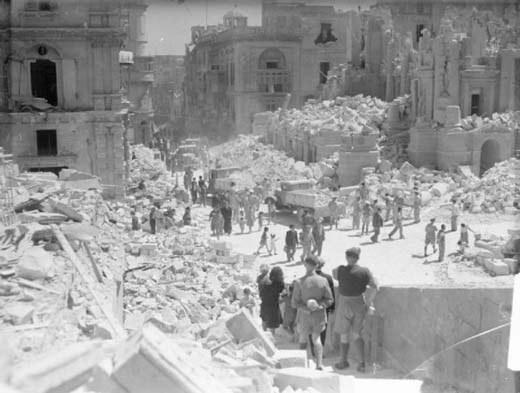Air Operations, Europe
US bombers conduct a daylight raid on the occupied French port of Cherbourg.
BOMBER COMMAND- 9 Bostons bomb the harbor and railway targets at Cherbourg without a loss.
- Dortmund is again the target as 152 aircraft including 111 Wellingtons, 19 Hampdens, 15 Stirlings and 7 Manchesters are sent. Although thick clouds and icing meet the bombing force, 88 planes claim to have hit the target area. Dortmund reports 1 house destroyed and 13 seriously damaged with 2 people killed and 6 injured. Bombs falling in Dortmund are the equivalent of 8 bomb loads. 3 Wellingtons and 1 Stirling are lost.
- In minor operations, 18 Whitleys are sent to St Nazaire, 8 Wellingtons to Le Havre, 4 Blenheim Intruders to Holland, 11 aircraft lay mines of St Nazaire and 4 are sent on leaflet flights over France. There are no losses.
Allied Planning
Harry Hopkins and Gen Marshall, Roosevelt's two envoys, return to Washington from London with the British approval of the BOLERO plan. The plan calls for the opening of a second front in Europe, but the details have yet to be worked out.
[Battle of the Atlantic
The unarmed US freighter Robin Hood (6887t), en route to Boston from Trinidad, BWI, is torpedoed and sunk by U-575 about 300 miles off Nantucket with the loss of 14 crewmen.
[Burma
Following their breakthrough on the 13th the Japanese continue to drive northward, isolating one of Slim's divisions, the Burmese 1st Division. British forces continue the destruction of the oilfields at Yenangyaung as Gen Slim begins to withdraw northward. The Chinese 38th Division fights well in covering the British retreat. With his flank exposed, Stilwell orders the Chinese to hold. One entire Chinese division deserts and disppears into the hills of Burma.
[Eastern Front
CENTRAL SECTORThe Germans launch a series of furious attacks against Soviet partisans and paratroopers trapped in the Dorogobuzh area.
[ Heavily Bomb-Damaged Street in Valletta, Malta |
 |